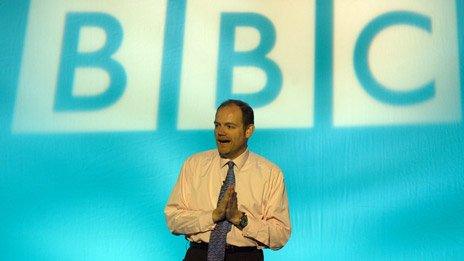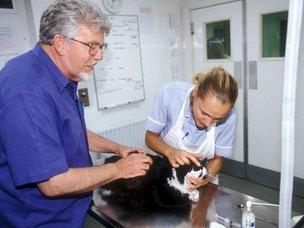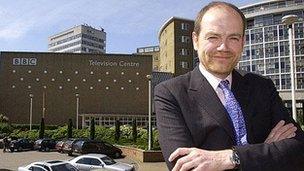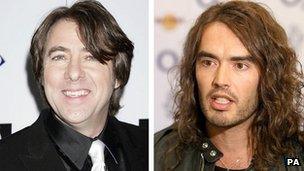Profile: Mark Thompson
- Published

Mark Thompson has been director general of the BBC since May 2004
BBC director general Mark Thompson is to become the chief executive and president of The New York Times Company when he steps down in autumn 2012, it has been announced.
The company said Mr Thompson's experience in digital media on a global scale made him the "ideal candidate".
His departure comes after nearly eight years at the BBC - making him the longest-serving director general in more than 30 years.
The 54-year-old has spent most of his professional career at the BBC, starting at the bottom of the broadcasting ladder as a production trainee in 1979.
After two years learning the ropes he became involved in launching the long-running consumer rights series Watchdog.
He went on to work on Breakfast Time and London Plus before being becoming output editor on Newsnight in 1985.
An Oxford graduate, he was appointed editor of the Nine O'clock News in 1988 before joining the Panorama team.
Factual shows

Animal Hospital was a ratings hit when Thompson was head of factual programmes
Rising through the ranks, Mr Thompson became head of features before being appointed head of factual programmes in 1994.
The father of three is credited with playing a key role in the strength of such factual shows as Animal Hospital, Modern Times and Ready, Steady, Cook.
As controller of BBC Two between 1996 and 1998, he presided over a number of critically acclaimed series including The Cops, The Royle Family, Our Mutual Friend and The Fast Show.
Factual programming during that time was also strong, with the likes of Storyville, Naked, Back to the Floor and Ground Force.
His next job saw him presiding over output across the whole of the UK as director of national and regional broadcasting.
A restructure by then-director general Greg Dyke saw Mr Thompson become director of television in April 2000.
'Creative deficit'
But the following year he left the BBC to become chief executive of Channel 4.
He began his tenure by announcing the station would make up the "creative deficit" in British television.

Thompson has not set a specific date for his departure
However, his first year in the job was marred by Boys and Girls, a ratings flop produced in conjunction with former DJ Chris Evans.
He also oversaw extensive cost-cutting that resulted in 200 redundancies and the closure of the Film Four production company.
Other casualties included long-running soap Brookside and unsuccessful breakfast show RI:SE.
But before he left, he brought in Five's Kevin Lygo as head of programming and initiated successful new dramas such as Shameless and No Angels.
Licence fee
Returning to the BBC in June 2004, Mr Thompson was seen as the man to steer the corporation onto firmer ground after the Hutton report led to the resignation of his predecessor, Greg Dyke.
On his first day, he restructured the corporation's management and appointed a new board to oversee journalism.
A week later, he launched a successful bid for the renewal of the BBC's charter - eventually securing the broadcaster's future until 2016.
He also achieved a degree of notoriety after it was revealed he had bitten a colleague on the arm during his time on the Nine O'clock news.
The BBC dismissed the incident as "horseplay". Mr Thompson later told the Independent: "I pretended to snap [my teeth] at him. Unbelievably, I connected with his arm."

Jonathan Ross and Russell Brand landed the BBC, and Mr Thompson, in trouble in 2008
While the incident overshadowed the beginning of his tenure as director general, Mr Thompson has weathered bigger storms in his eight years at the top.
One of the first came when a trailer for a documentary about the queen was edited out of sequence. BBC One controller Peter Fincham told the press it showed the monarch walking out of a photo session "in a huff", and later resigned over the affair.
That was followed by a crisis over faked phone-ins and competitions, which saw the BBC fined hundreds of thousands of pounds by media watchdog Ofcom.
And the infamous row over Russell Brand and Jonathan Ross's lewd phone calls to actor Andrew Sachs played out in headlines for months.
Internally, the BBC has also been shaken up over the last eight years, with three separate programmes of cost-cutting and staff redundancies.
Mr Thompson announced his first restructure in May 2005, saying he wanted to create a "smaller and simpler" BBC in advance of his bid to secure an above-inflation increase in the licence fee.
Along with then-chairman Michael Grade, he argued that the cost of a TV licence should increase to £180 in order to fund the switch-over to digital TV and BBC on-demand services.
The government disagreed with the plan, leaving the BBC with a projected £2bn budget shortfall.
That led to a second round of staff cuts; while the coalition government's decision to freeze the licence fee and make the BBC pay for the World Service ensured a third, which is still under way.

The format for Strictly Come Dancing has been sold around the world, supplementing the BBC's licence fee income
"I don't think we could do this again," Mr Thompson told staff after announcing the latest restructure in October 2011.
"Another real terms cut in the licence fee would lead to a loss of services, or potentially a diminution of quality, or both."
Despite the upheaval internally, Mr Thompson has also overseen some big successes for the BBC as it enters the digital era - not least in the launch of the iPlayer in 2007.
He also recently announced Project Barcelona, a service which will allow viewers to permanently download copies of their favourite shows from the BBC's archives.
Flagship shows
On air, Mr Thompson can claim credit for resurrecting Saturday night television, thanks to ratings hits Doctor Who and Strictly Come Dancing.
Other flagship programmes developed under his watch include Life On Mars, The Frozen Planet and Radio 4's breakout series A History of the World in 100 Objects.
Speaking to the Royal Television Society, Thompson said he was "incredibly proud of the new emphasis we've given to science on the BBC" with shows like Bang Goes The Theory and Wonders Of The Universe.
He added that shows like Sherlock, The Shadow Line and The Hour heralded "the return of really rich, intelligent original drama to the screen".
However, he conceded that when he travelled abroad the programme he was congratulated most often for was ITV's Downton Abbey.
"When Americans in the grip of Downton-fever slap me on the back, I just smile modestly and say: 'You know I really had very little to do with it,'" he joked.
Mr Thompson's final tasks included presiding over coverage of the Queen's Diamond Jubilee and the London 2012 Olympics.
Elements of the Jubilee programming came in for criticism, with coverage of the river pageant described as "inane" and "tedious" in the press.
More than 2,000 viewers contacted the BBC to complain about the programming but, in an internal email to staff, the director general said he was very proud of the coverage.
The BBC's role in the Olympics received much more positive reviews - even outside the UK. Mr Thompson told staff it was "only with the dedication and commitment of teams from every part of the BBC that we have been able to deliver it so successfully".
George Entwistle, the current director of BBC Vision, was named as Mr Thompson's successor in July and will take over in September.
- Published14 August 2012
- Published19 March 2012
- Published14 March 2012
- Published27 January 2012